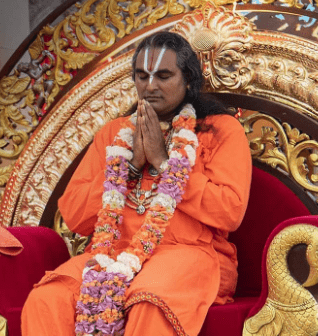True happiness can never be found when it is dependent on something that is perishable, as it will inevitably die or disappear at some point in time. True love and lasting happiness can only be experienced with something or someone who is eternal.
The Perishable and the Imperishable
'Beings exist in two distinct forms: perishable and imperishable. The material body bound to the material world is perishable, while the immutable Self is imperishable.' –Bhagavad Gita 15.16
In Chapter 15, verse 16, of the Bhagavad Gita, Krishna talks about what is perishable and what is imperishable. The material world, or nature, is perishable. It is anything that changes and decays with time. This includes matter (physical substances), the body (made up of the five elements), and the mind (which includes the ego and intellect). The unchanging Self, however, (the atma or individual soul) is eternal and spiritual. When the atma acquires the five senses and the mind in the material world, it adopts a material identity and forgets its spiritual nature or identity. Although we may identify with our personality or character, name, and physical body, we are, in truth, spiritual.
'But different and beyond these two forms is the highest Purusha, described as the Supreme Self or Supersoul (Paramatma), He is the unchanging Lord who pervades the three worlds and supports it.' – Bhagavad Gita Essentials 15.17
God is also eternal and unchanging. Chapter 15, verse 17 of the Gita highlights the nature of God. In Bhakti Marga, we call God, Sriman Narayana. Narayana means the One who dwells in all things and in Whom all things dwell. We believe that God is both in the world and beyond it, both immanent (as an indweller) and transcendent. God is completely independent of both the perishable and the imperishable. At the same time, the all-pervading God has also manifested, entered, and supports the universe or creation. Although He is within us, He also takes on outer forms.
Through His teachings on the Bhagavad Gita, Paramahamsa Vishwananda taught me that the ultimate goal of life is to attain the Lotus Feet of Sriman Narayana, the Supreme Lord.
Aim for the Eternal
Once we begin to understand what is eternal and what is temporary, it becomes obvious that we need to aim for the eternal in order to experience everlasting happiness and undying love.
Seeking love and happiness in places outside of ourselves, beyond our control, stems from an attraction and attachment to all things temporary and perishable. Instead, we need to look within, to the reality that we can control, and to the eternal sources that are within us: the soul and God.
When you can identify yourself with your true Self or essence of being (Self-realisation) and understand the reconnection between your soul and God, the happiness and love expressed between the two eternal beings, your soul and God, will provide you with a fulfilment that cannot be taken away. It is permanent, and it is the call of every human being. God, the source of our being, is also the source of all the experiences that our being craves. In the same way that we find ourselves in God, we can also find all that we desire in God. God-realisation is when we are one with God.
Therefore, the supreme goal of life is to re-establish a perfect relationship with God.
Our Eternal Relationship With God
The natural follow-up question is, ‘What is the relationship between our soul and God?’ In Bhakti Marga, we believe in personalism: that God is a person. We have an eternal relationship with Him in the same way that people have relationships like father and son, best friends, and so on. Love, selfless willing service, and connection bind us together in an eternal relationship.
Devotion and Surrender
'By devotion alone, he gains the true knowledge of who and what I am. Knowing Me in this way, through this devotion, he unites with Me.' –Bhagavad Gita Essentials 18.55
Krishna clearly states that one can only unite with God through devotion. Devotion is action done out of love, for the sake of love alone. Bhakti-yoga, the yoga of devotion, is union with God through unceasing, single-pointed, and devoted action. This union strengthens when we act out of a deep love, and we seek to remove the barriers and obstacles that our mind has built against this Divine Love. The more devoted we are to someone or something, the more love flows easily.
'Fix your mind on Me, be devoted to Me, worship Me, bow down before Me and you shall come to Me. I promise you this for certain, for you are dear to Me.' –Bhagavad Gita Essentials 18.65
Focus your mind on God. Make God the focal point of all your actions, and prioritise Him. When we do, He promises that we shall be with Him. Make every thought, word, and action a loving and grateful offering to God. This is the meaning of surrender. The beauty of being on the path of devotion is that we can use whatever we have and whatever we do in service to God, and in this way we build a loving relationship with Him.
Bhakti Marga - the Path of Devotion
Bhakti Marga offers a unique four-armed approach to help us cultivate a very deep and personal relationship with God. Whether it be through Scriptural Knowledge, Yoga & Meditation, Worship Rituals, or Devotional Arts (music, painting, theatre), we can easily find our own unique way to experience and express our love and devotion for God. These spiritual practices complement each other and allow us to quickly develop a loving relationship with God.
Saving Grace is Required
'Constantly engaged in all prescribed duties, but utterly surrendered to Me, through My grace, he attains the eternal, changeless state.' –Bhagavad Gita Essentials 18.56
Krishna makes an important point here. We should rely on God's saving grace. Grace is God's presence and the power that uplifts us. Coming to know your Self (Self-realisation) can be accomplished through your own effort, but knowing God in His entirety requires grace. It's like climbing a mountain; we can do it with our own strength, but we need grace to reach the sun. Grace must be earned and comes only when we make a sincere and genuine effort to do our best. We can't just sit back and expect the treasure to fall on our heads; we must strive and yearn to know God in His fullness.
Bhakti-yoga is a fast track to God-realisation. We only need to have a true longing, a deep yearning, and make sincere efforts towards developing a loving personal relationship with God. When we do, God-realisation can be awakened within us through the grace of our satguru.
The Value of a Spiritual Master
In all Eastern traditions, building a relationship with the guru is a normal and common part of a person's development. The term 'guru' has become diluted in our modern language. There are all sorts of gurus: finance gurus, marketing gurus, life gurus, and so on. Yet, sadly, when many people hear about a spiritual master or spiritual guru, a sense of fear immediately kicks in – a fear of being bound by rules and regulations, or of losing individuality.
'When you want to learn science, you have to go to a science teacher, right? When you have to learn math, you go to a math teacher. The spiritual science, the science of the soul, the science of God, is given by the satguru.' – Paramahamsa Vishwananda
A satguru is more than just a simple guide, mentor, or coach. A satguru is an expert in spiritual science who shines light into the darkness of spiritual ignorance. A satguru is a true guru. He is the knower of the Truth, and He is the One who is able to impart that same Truth to others. He is the guru of gurus. It is very rare to come into contact with a satguru like Paramahamsa Vishwananda.
How to Approach a Spiritual Master
'One should approach a spiritual master with submission, extensive enquiry, and service. Such realised souls can instruct you, for they have seen the Truth.' –Bhagavad Gita Essentials 4.34
The Gita tells us how to approach a spiritual master. Only when we acknowledge a master's expertise in transcendental subjects and spiritual science, can we approach him in humility and submission. Only then can we be open to learn from him, to receive what he has to give us.
First and foremost, if you want to attain God, you must find someone who knows God and then you must be willing to follow that master’s instructions about how to attain the Supreme. Paramahamsa Vishwananda lives in constant union with the Divine, and He has the ability to grace others with the same level of realisation.
Second, you must be eager to learn and to ask questions to help you better understand the goal and the path. You must make a sincere effort to gain as much as possible. Paramahamsa Vishwananda's Bhakti Marga path provides us with a variety of live and online courses, spiritual practices, as well as books, videos and experiences to help us learn, grow and deepen our connection with God.
Third, you must learn through doing, through offering selfless service to the master and His mission. The service should be given willingly, without regard for the outcome, and as an expression of love and gratitude to the spiritual master for what he does for his devotees. While it may look like we are serving the master, in truth, He is serving us by giving us the opportunity to learn and grow through serving the Divine in others. We cannot possibly comprehend all that Paramahamsa Vishwananda does for us; it is simply immeasurable.
When we, as sincere seekers, have a deep longing to go beyond the mundane life we are living and seek Paramahamsa Vishwananda's shelter and guidance, He promises to walk with us on this journey. By His grace, He awakens the knowledge of the soul and God in our hearts and guides us to the Truth. Only those who know the Truth can share it with others.
A Personal Reflection
Looking back over the years, I can see an accelerated personal transformation since the time of my initiation as Paramahamsa Vishwananda’s devotee. Gurudev's presence in my life, both in person and through His teachings, has allowed me to see life as a wonderful spiritual journey. Sometimes there are many challenges, and sometimes less. Each day, however, has become an attempt and an opportunity to transform and experience my life from a place of love.
My experiences have led me to believe that there is no greater gift from God than life itself and that the purpose of life is to cultivate an ever-expanding loving relationship with God: God in His fullness as Sriman Narayana, God within His creation, God within us, and God in others. I have more courage and confidence than ever before to love myself, others, and God joyfully. That, to me, is true freedom.








